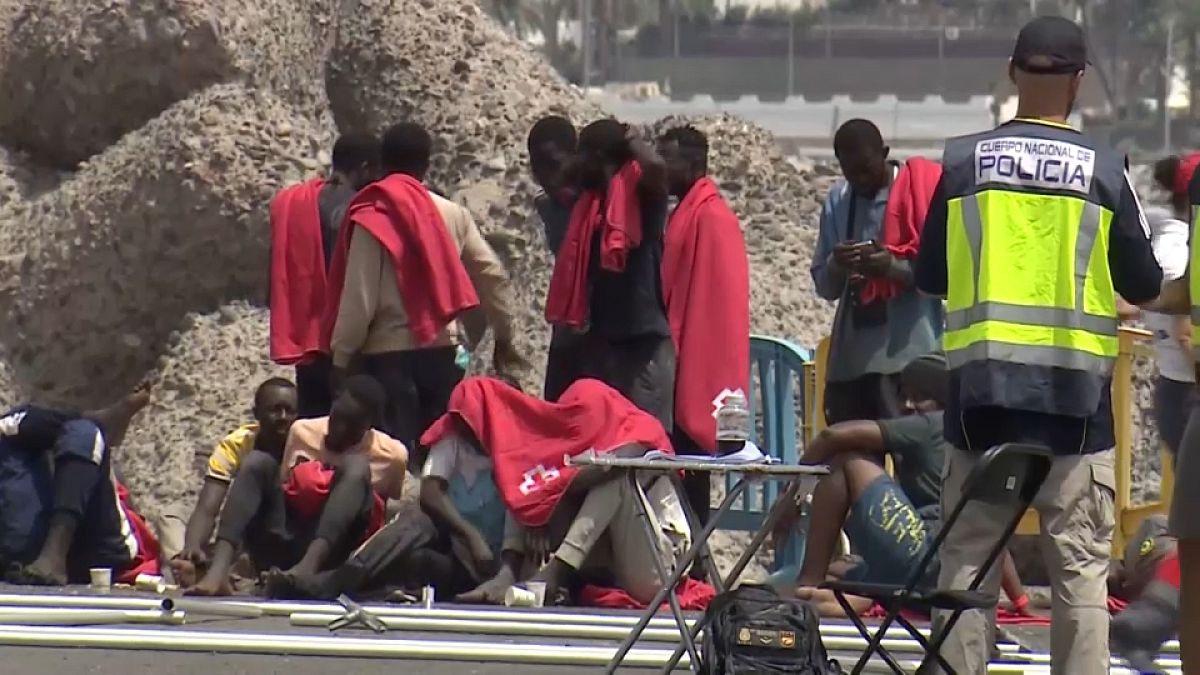The number of migrants making the dangerous sea crossing from Africa to the Canary Islands has significantly increased, with a 160% jump between January and July compared to the same period last year. In a recent incident, four boats carrying over 300 migrants arrived at the Spanish island of Gran Canaria in less than 24 hours. One of the boats, a wooden vessel carrying 64 people, arrived unassisted, with 11 individuals requiring medical attention, including four reported to be in critical condition. Another boat carrying 145 sub-Saharan African migrants was escorted to port by the Maritime Safety and Rescue Society after being spotted southeast of Gran Canaria, with all passengers said to be in good physical condition.
The Spain Interior Ministry revealed that nearly 20,000 people had made the perilous sea journey to the Canary Islands between January and July of the current year. The overall arrivals by sea to Spain, including the mainland, increased by 88% to approximately 25,300 people during the same time period. The route from Africa to the Canary Islands, located off the southern coast of Morocco, is noted as the fastest-growing migration route to Europe. Frontex, the European border control agency, reported a significant 303% increase in irregular crossings from January to May compared to the previous year. Many of the arrivals to the Canary Islands are unaccompanied minors, putting a strain on services across the archipelago, where there are nearly 6,000 immigrant children reportedly.
The rise in migrant crossings to the Canary Islands is a concerning trend that highlights the urgent need for comprehensive solutions to address migration challenges in the region. The significant increase in arrivals puts a strain on resources and services, particularly in dealing with unaccompanied minors who make up a considerable portion of the migrants reaching the islands. The dangerous journey across the sea poses risks not only to the migrants themselves but also to the rescue teams and authorities tasked with managing these arrivals. It is essential for the relevant authorities to collaborate with international partners to develop sustainable and humane approaches to address the root causes of migration and provide adequate support for those in need.
The surge in migrants arriving at the Canary Islands underscores the need for enhanced border control measures and effective cooperation between countries to address the growing challenges of irregular migration. As the number of arrivals continues to rise, it is crucial for the Spanish government and European Union to allocate resources and develop comprehensive strategies to manage the influx of migrants effectively. Addressing the root causes of migration, such as poverty, conflict, and lack of opportunities in the migrants’ countries of origin, is essential to create long-term solutions to the ongoing crisis. By working together and implementing holistic approaches, authorities can better manage the arrivals, provide necessary support to migrants in need, and ensure the safety and security of both migrants and local communities.
The influx of migrants to the Canary Islands highlights the need for a coordinated and compassionate response to address the challenges posed by irregular migration. As the number of arrivals continues to increase, it is crucial for the Spanish government, in collaboration with the European Union and relevant international partners, to prioritize the safety and well-being of migrants while managing the impact on local communities. By strengthening border control measures, enhancing search and rescue operations, and providing adequate resources for migrant support services, authorities can better handle the influx of arrivals and ensure a more humane and sustainable approach to migration management. It is imperative for all stakeholders to work together to address the root causes of migration and provide effective solutions to support those in need while fostering greater stability and security in the region.
In conclusion, the significant increase in migrant crossings to the Canary Islands underscores the pressing need for concerted efforts and comprehensive strategies to address the challenges posed by irregular migration. By prioritizing the safety and well-being of migrants, collaborating with international partners, and addressing the root causes of migration, authorities can develop sustainable solutions to manage the influx of arrivals effectively. The recent surge in migrants reaching the Canary Islands serves as a wake-up call for all stakeholders to work together towards a more compassionate, coordinated, and humane approach to migration management, ensuring the dignity and rights of migrants while supporting the stability and security of local communities in the region.











